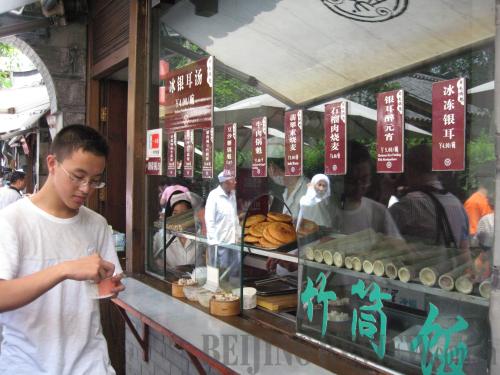|
New opportunities ahead
 |
|
LOCAL TASTE: People are attracted by delicious snacks in Chengdu (WANDI) |
"As a city of more than 2,300 years, Chengdu has accumulated a rich heritage of culture, gastronomy, design, constructions and folk arts. Today, this heritage has been transformed into social wealth shared by the Chinese and people all over the world," said Hua Jian, Director of Cultural Industries Research Center of the Shanghai Academy of Social Sciences and the chief expert of the team that prepared the city's application.
The secret to Chengdu's success was in its advantages in gastronomy, and its overall strength including tourism and culture, Hua said. These factors constituted the city's major attraction. Moreover, the city is striving to be a green, low-carbon, ecological and harmonious economy as advocated by the whole world.
"In particular, I want to say the application work faced many difficulties, especially the devastating Wenchuan earthquake in 2008. Dealing with the difficulties, people in Chengdu demonstrated an indomitable spirit. This also helped us win the respect of the world and helped win the title," Hua said.
Di Jiankai, Director of the Trade Service Division of China's Ministry of Commerce, also approves Chengdu and Sichuan cuisine as an important component and outstanding representation of Chinese food.
Entrepreneurs from local catering industries in Chengdu were also encouraged by the great news.
Winning the award was "a gorgeous opportunity" for the development of catering enterprises during the next few years, said Li Hao, CEO of Sichuan Fuke Food Co. Ltd., one of the successful companies that run Sichuan cuisine chain restaurants. From this platform, local catering enterprises could develop more quickly within China and abroad, he said.
About Chengdu
Longitude: 102 ° 54' - 104 ° 53' E
Latitude: 30 ° 05' - 31 ° 26' N
Area:12,390 square km
Population:11.25 million
Climate: Typical subtropical, humid
The Creative Cities Network
The Creative Cities Network, started by UNESCO in 2004, is one of the world's highest-level non-governmental organizations in creative industry.
The network focuses on the excellence of its member cities as its main product, and finds ways to maintain relevance in city life, local economy and social development. There are seven fields of excellence: gastronomy, literature, film, music, design, media arts, and crafts and folk arts. Each field is assessed and to win the title a city should meet corresponding stringent standards.
To win the title of World Gastronomy Capital, the candidate city should live up to eight standards:
- Well-developed gastronomy that is characteristic of the urban center and/or region;
- Vibrant gastronomy community with numerous traditional restaurants and/or chefs;
- Endogenous ingredients used in traditional cooking;
- Local know-how, traditional culinary practices and methods of cooking that have survived industrial/technological advancement;
- Traditional food markets and traditional food industry;
- Tradition of hosting gastronomic festivals, awards, contests and other broadly targeted means of recognition;
- Respect for the environment and promotion of sustainable local products;
- Nurturing of public appreciation, promotion of nutrition in educational institutions and inclusion of biodiversity conservation programs in cooking schools curricula.
(Source: www.unesco.org) | 